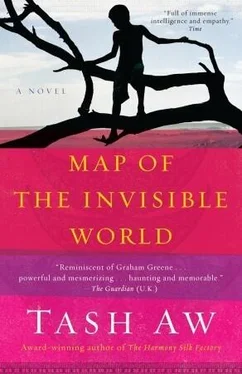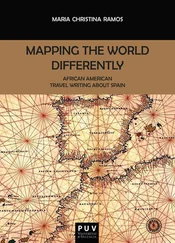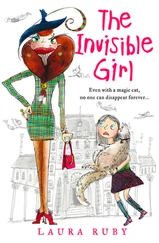Tash Aw - Map of the Invisible World
Здесь есть возможность читать онлайн «Tash Aw - Map of the Invisible World» — ознакомительный отрывок электронной книги совершенно бесплатно, а после прочтения отрывка купить полную версию. В некоторых случаях можно слушать аудио, скачать через торрент в формате fb2 и присутствует краткое содержание. Год выпуска: 2010, Издательство: Spiegel & Grau, Жанр: Современная проза, на английском языке. Описание произведения, (предисловие) а так же отзывы посетителей доступны на портале библиотеки ЛибКат.
- Название:Map of the Invisible World
- Автор:
- Издательство:Spiegel & Grau
- Жанр:
- Год:2010
- ISBN:нет данных
- Рейтинг книги:4 / 5. Голосов: 1
-
Избранное:Добавить в избранное
- Отзывы:
-
Ваша оценка:
- 80
- 1
- 2
- 3
- 4
- 5
Map of the Invisible World: краткое содержание, описание и аннотация
Предлагаем к чтению аннотацию, описание, краткое содержание или предисловие (зависит от того, что написал сам автор книги «Map of the Invisible World»). Если вы не нашли необходимую информацию о книге — напишите в комментариях, мы постараемся отыскать её.
comes an enthralling novel that evokes an exotic yet turbulent place and time—1960s Indonesia during President Sukarno’s drive to purge the country of its colonial past. A page-turning story,
follows the journeys of two brothers and an American woman who are indelibly marked by the past — and swept up in the tides of history.
Map of the Invisible World — читать онлайн ознакомительный отрывок
Ниже представлен текст книги, разбитый по страницам. Система сохранения места последней прочитанной страницы, позволяет с удобством читать онлайн бесплатно книгу «Map of the Invisible World», без необходимости каждый раз заново искать на чём Вы остановились. Поставьте закладку, и сможете в любой момент перейти на страницу, на которой закончили чтение.
Интервал:
Закладка:
“What about you?” Neng asked. “Where did you come from?”
Adam shrugged. He looked around, hoping to see those parakeets again, but there was nothing.
“Sorry,” she said, reaching out and touching him on the elbow. Her scar obscured her cheek and made her look as if she was only smiling with half her face. “I forgot you’re an orphan.”
“That’s okay.” He smiled. But he thought to himself: It was not okay. Why did he not know which part of Indonesia he was from? What dialect had his parents spoken? Even orphans had to come from somewhere. It was not that he had never dared ask Karl, but rather that it had never occurred to him to ask. He had known little of his past and cared even less, and he had liked it that way. So why was he now troubled by this lack of knowledge? Suddenly he felt guilty at having missed school without telling Karl.
“Come on,” Neng said, breaking into a run, “there’s something I want to show you.” Beyond the trees the grassland gave way to a rocky plain covered with cacti and scrubby bushes; in the distance the land rose toward the point of the dead volcano that dominated the island. Neng disappeared behind some rocks, and when Adam caught up he saw that she had crawled into a natural depression sheltered from the sun and the rain, a scooped-out hollow so perfectly formed that it seemed man-made.
“Here, look,” Neng said, showing him a stash of objects. She picked up a small comb made from pink plastic and ran it through her spiky hair. “I found it on the road, just lying there waiting for me to pick it up.”
“But that’s stealing,” Adam said, repeating what Karl had once told him.
“Don’t be stupid. If something is thrown away, it means its owner doesn’t want it anymore — in that case anyone has a right to take it. Idiot.” She showed him other things she had found: a small motorbike made of tin, rusting where the paint had worn off; a cracked mirror; a book with a frayed paper cover showing a large sea fish about to be attacked by a diver wielding a knife (there were some words in German too, but Adam was not able to read them); and a doll with blue eyes and dark curly lashes. Its painted blond hair looked like a scar on its head, an imperfection. Neng picked it up and cuddled it as if it were a real baby, holding its head to her cheek and swaying from side to side; she sat down with her legs crossed and looked out of the miniature cave. They could see over the low trees to the tawny flatlands and the sea in the distance. “No one can see me in here,” she said. “It’s my secret place.” She leaned over and kissed him on his cheek and he could smell the musty unwashed odor of her clothes and skin. He blushed, and withdrew slightly; her lips felt funny — dry and hot; he wasn’t sure he liked it. She giggled and continued to cuddle her doll.
From then on, they skipped school every day, cycling as far as they could or taking long walks into the interior. In the coves of the south coast they stood atop the steep fern-covered cliffs and saw the shipwrecks poking out of the surf; in a rainstorm in the hilly forests they were chased by wild goats; in a dried-up riverbed they found the giant stones for which Perdo is famous, those ancient boulders inscribed with fragments of scrolling words in a foreign language that Adam copied in a notebook and later found out were Spanish (and also nonsensical: dream and madman) . They met a team of scientists who were taking rock samples not far from where Adam lived; they wanted to build a mine, but they did not say what kind. One of them, an American, gave Neng and Adam three dollars each and an old T-shirt that said BERKELEY. Neng said Adam should have the T-shirt. She didn’t want it; she was happy enough as it was, not because of the money, but because her father would finally, FINALLY! have a job in this mine. That was what she kept repeating to Adam as they cycled home. She turned around and made funny faces at him, the bike zigzagging along the road. Above them, a flock of birds winged their way slowly southward, small, black flapping triangles against the blue white sky. Maybe they were migrating to cooler climates, Adam said, to Australia, and Neng replied that he couldn’t possibly know such a thing. He did not know what kind of birds they were; and he did not know either that this would be the last thing he would say to Neng.
The next day she was not waiting for him at the bend in the road, and when he got to school she was not there. He asked around and everyone said, Oh, yeah, that Madurese girl, her parents went back to Java or somewhere else, dunno, happens all the time with migrants, they weren’t born here so why should they stay?
Adam continued at school; his days were not the same without Neng. His nights, which had for some time been calm and heavy with sleep, became unreliable once more. The sensation of emptiness that punctuated his slumber returned, more frequently and powerfully than before. In his sleep he felt suspended in a void, and he would wake with a start, his legs jerking madly. When he awoke in the dark, he felt as if he had dreamed about his brother, but no image of Johan ever stayed with him, and he realized that his sleep had been as dreamless as ever. He had merely imagined dreaming of Johan — a dream of a dream. He thought he had banished fear from his life, but it was clear that he had not. He would go to the window and stare out at the inky blackness, at the shapes of the trees silhouetted against the night sky, and it would calm him a little to know that he was not in his Old Life with its unknown terrors but in his New Life with its known terrors, which were far less terrible.
One morning he awoke to find a large box on his bedroom floor wrapped in colorful paper printed with a pattern of butterflies and bow ties. There were creases on the paper as if it had been left folded for a very long time.
“Happy birthday,” Karl said, appearing in his doorway. Adam suddenly realized he did not know when his birthday was. At the orphanage there had been no celebrations — at least none that he could remember. “I didn’t know when your birthday was so I decided that, from now on, we shall celebrate it on the anniversary of your arrival in this house.” Adam had not realized that he had spent an entire year there; it seemed only minutes since he’d arrived.
“Why are you doing that?” Adam asked as Karl closed the shutters and door. It was a dull, drizzly morning, the sea mists remaining longer into the morning than usual.
“You’ll see,” Karl said, placing the box on Adam’s bed. “Go on, open it.”
Adam picked nervously at the wrapping paper until he saw a flimsy cardboard box, frayed and torn at the edges. It bore a picture of a curly-haired woman gaily spraying her underarms with deodorant. She wore bright red lipstick to go with her bright red dress and she showed off a bright red flower in her hair.
“That’s just the box,” Karl said, taking it from Adam. “Here, I’ll show you.” He reached inside and produced a glasslike object, not quite a globe. “It’s a magic lantern. Let me show you how it works.” He switched on the table lamp and placed the lantern on top of it. All at once the walls of Adam’s bedroom faded away and suddenly he was in a forest in Europe. A thicket of pointy trees engulfed his cupboard and from the trees a handsome blond boy emerged, riding a horse that glided over yellow moors. The sunlit sky swirled over this scene, golden and streaked with fantastic clouds. There was a castle too, honey-colored, but it was sheared off by a wide arc and faded into pearly blankness.
“Sorry, that’s where the disc fits into the lamp,” Karl said, reaching for the lantern and fiddling with it. For a moment the hollow gloom of Adam’s room returned once more but then, once Karl had adjusted the lantern, the dream resumed. A princess with pale blond hair and a blue gown stood atop the half castle, pleading with the youth to come to her.
Читать дальшеИнтервал:
Закладка:
Похожие книги на «Map of the Invisible World»
Представляем Вашему вниманию похожие книги на «Map of the Invisible World» списком для выбора. Мы отобрали схожую по названию и смыслу литературу в надежде предоставить читателям больше вариантов отыскать новые, интересные, ещё непрочитанные произведения.
Обсуждение, отзывы о книге «Map of the Invisible World» и просто собственные мнения читателей. Оставьте ваши комментарии, напишите, что Вы думаете о произведении, его смысле или главных героях. Укажите что конкретно понравилось, а что нет, и почему Вы так считаете.












